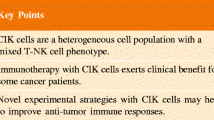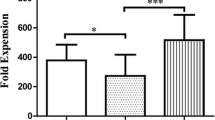Abstract
The aim of this study was to activate, in mixed leukocyte/tumor cell cultures (MLTC), cytotoxic lymphocytes exhibiting preferential activity in vitro and in vivo towards allogeneic mouse lymphoma cells. Whereas the lymphoma target cells were readily lysed by the MLTC-derived lymphocytes, the cytotoxicity against the corresponding allogeneic concanavalin-A(ConA)-induced lymphoblasts was more than tenfold lower. Both activities were mediated by CD3+, TCR+, CD8+, CD4− cytotoxic T cells (CTL). ConA-induced lymphoblasts were readily lysed by anti-Thy1.2 antibodies and complement, by CTL derived from mixed leukocyte cultures (MLC) and by the MLTC-derived CTL in the presence of ConA, indicating that the lymphoblasts are not merely less lysable than the lymphoma cells but that the latter are specifically recognized by the CTL. Lymphoblasts poorly competed with 51Cr-labeled lymphoma cells in a “cold”-target competition assay, suggesting that the MLTC-derived CTL largely recognize epitopes expressed only by the lymphoma cells. Furthermore, analysis of the cytotoxic activity of more than 500 MLTC-derived CTL oligoclones and over 30 clones revealed that one-third of them were cytotoxic only against the allogeneic lymphoma cells, one-third were reactive against both the lymphoma and the allogeneic lymphoblast target cells and the remainder were not cytotoxic at all. Upon injection into sublethally irradiated, lymphoma-bearing allogeneic mice, the MLTC-derived CTL cured 56% of the recipients and caused graft versus host disease (GVHD) is only 22%, whereas CTL activated in MLC against allogeneic splenocytes were therapeutically ineffective and caused lethal GVHD in 89% of the recipients. Although the therapeutic efficacy of the in vitro-generated antitumor CTL was demonstrated against experimental lymphoma lines, this strategy might prove effective in tumor immunotherapy in conjunction with other modalities.
Similar content being viewed by others
Author information
Authors and Affiliations
Additional information
Received: 24 December 1998 / Accepted: 5 April 1999
Rights and permissions
About this article
Cite this article
Leshem, B., Dorfman, Y. & Kedar, E. Induction of preferential cytotoxicity against allogeneic mouse lymphoma cells: in vitro and in vivo studies. Cancer Immunol Immunother 48, 179–188 (1999). https://doi.org/10.1007/s002620050563
Issue Date:
DOI: https://doi.org/10.1007/s002620050563




